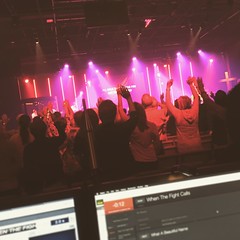“Old People” Myths & Misconceptions
I want to address something because I think there are some big misconceptions and myths related to “old people” in churches today. When I first got involved in church sound over 15 years ago, the “old people” landscape looked a lot different, but preconceptions about “old people” in church haven’t changed much while the group that makes up the supposed “old people” has changed quite a bit.
Let’s just look at something for a minute. The guys in AC/DC are now in their 60’s and 70’s. Jimmy Page and the Led Zeppelin boys are in their 70’s. Ozzie Osbourne from Black Sabbath is 69. The guys in Metallica are in their 50’s. Paul McCartney is 76. The Stones are in their 70’s. The guys in Aerosmith are in their 60’s and 70’s. The guys in U2 are in their 50’s. Even the guys in Pearl Jam are in their 50’s now.
Yes, it’s true. “Old people” are now rockers.
Think about this for a minute. A lot of the “old people” in church today grew up with rock and roll. “Loud” music was a part of the culture they came from. I’d also venture that more and more of the “old people” today are the same people who grew disenfranchised with traditional church in the 80’s and 90’s and are more opent to something non-traditional because the “old people” are the ones who created the modern non-denominational church.
Here’s a story a good friend of mine loves to tell. A while back–maybe 8 or 9 years now–we did a Saliva tune as an opener at North Point. After the opener, an elderly woman approached FOH. I immediately made an assumption about the nature of her encounter so I quickly turned to my A2 and said something along the lines of, “You take this one.” Much to my surprise, the first thing out of her mouth to him was, “That was awesome!!”
Our Hillsong, Jesus Culture, Elevation, Bethel, etc. contemporary worship would not have happened without the so-called “old people” who went before them to create environments where that music could develop. Brian Houston, for example, who founded Hillsong Church is in his mid-60’s.
So what does all of this mean?
We have to be careful about the assumptions we make when we’re getting feedback especially when it pertains to different demographics. When someone we perceive as “old” says it’s “too loud”, I believe there’s a higher probability these days that it’s either actually too loud or that there’s something actually wrong with what they’re hearing. Maybe the band needs some work. Maybe someone on stage is not having a good day. Or maybe…just maybe…there’s something with the mix and the audio presentation that could use work.
Now, sometimes “too loud” can still mean “I don’t like this music” or “I don’t like the way the band looks”. That’s always going to be out there if you’re involved in audio, and you’re going to have to do some digging to find out what’s really going on if you’re getting those “too loud” comments. But don’t just discount opinions because of the age of the person delivering it. These days, a lot of “old people” like to rock.
If you get “too loud” complaints on a regular basis, I’d love to talk to you. That’s one of the things I look at regularly when I am providing training in churches. If you’d like to find out more about how I can bring audio training directly to you to help take your team’s audio game to the next level and cut down on the “too loud” complaints, drop me a line through my Contact page.


 Next Post
Next Post



“loud” is such a subjective topic. Many years ago I went to a classical concert of Beethoven and brought a dB meter in my pocket. The audience was a majority of “old people.” I was sitting quite a ways back in the room and a few times recorded over 100dB. I am convinced that much of the “it’s too loud” debate is based on personal preference and music genre preferences rather than dB-SPL numbers. And churches that try to force worship within a SPL number range don’t understand the issue fully.
Some of it is definitely personal preference but not always. A common bit of feedback I get from churches when I am doing a mixing workshop and sometimes mixing there on Sunday is that it’s the first Sunday they can remember where they didn’t get any “too loud” complaints. A lot of times “too loud” means there’s something out of balance with the mix.